Moraa streaks to victory in World Champs
Overlooked Kenyan turns back Hodgkinson and Mu in thrilling 800
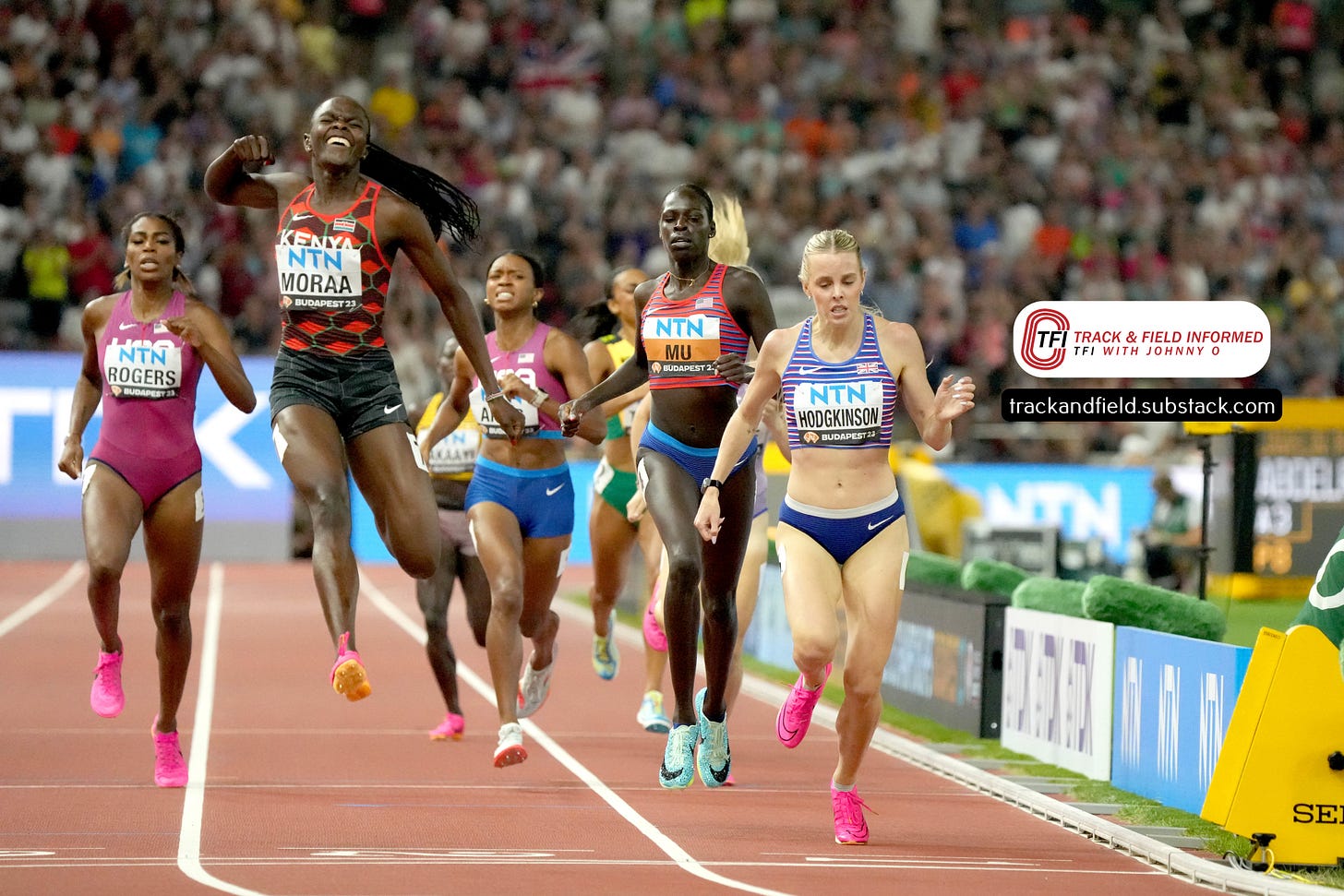
Contrary to what the announcers at NBC Sports were telling their audience after the finish of the women’s 800 meters in the World Athletics Championships in Budapest, Hungary on Sunday, Mary Moraa’s victory was not an upset.
Yes, the Kenyan had finished third behind Athing Mu of the U.S. and Keely Hodgkinson of Great Britain in last year’s World Championships in Eugene, Oregon.
But she had won seven consecutive 800-meter races outdoors since then and defeated Hodgkinson in both the Commonwealth Games in Birmingham, England last August and in the Athletissima Diamond League meet in Lausanne, Switzerland on June 30.
Olympic silver medalist Hodgkinson had run a world best of 1:23.41 for 600 meters indoors in January and opened her outdoor season with a national record of 1:55.77 in the Meeting de Paris Diamond League meet on June 9. But Moraa had beaten her soundly in Lausanne.
As for Mu, she had run only one 800 and one 1,500 entering the meet and her coach, Bobby Kersee, had told the Los Angeles Times on August 2 that a decision had not yet been made about whether she would defend her title in the World Championships or skip the meet to focus on the Olympic Games in Paris next summer. That did not sound like a recipe for a successful title defense of an event she had won by eight hundredths of a second last year.
Yet as the competitors were being introduced before the race, NBC’s Sanya Richards-Ross said the following about Hodgkinson: If there’s anyone in the field who can give Athing Mu a challenge, it’s her.
The 23-year-old Moraa, it seemed, was running for no better than a bronze medal.
Then the race began.
Mu went to the lead almost immediately and led the field through the 200-meter mark in 26.51 seconds, followed by Hodgkinson, her British teammate Jemma Reekie, and Moraa.
At 400 meters in 56.01, it was Mu in first place, followed by Moraa, Reekie, and Hodgkinson.
Mu briefly opened up a small lead on her closest pursuers starting down the backstretch, but when she came through 600 meters in 1:26.21, Moraa, Hodgkinson, and Reekie were close behind her.
Mu continued to lead around the final curve, but Moraa began to move up on her as they entered the home straightaway and she began to pass her with about 50 meters left in the race. Mu had no response to Moraa’s move and then she began to lose ground to Hodgkinson, who was coming up on her on the inside of lane one as Mu had made a tactical error and left it open.
For a second or two, it looked like Hodgkinson might catch Moraa. But the Kenyan drew away from her over the final 25 meters of the race before leaping in the air and pumping her right fist as she crossed the finish line.
Moraa’s time of 1:56.03 was a personal best and moved her to second on the all-time Kenyan performer list. Hodgkinson ran 1:56.34, with Mu at 1:56.61.
Olympic bronze medalist Raevyn Rogers of the U.S. finished fourth in 1:57.45, followed by Reekie in 1:57.72, and Nia Akins of the U.S. in 1:57.73.
After performing a joyful post-race dance that is fast becoming her trademark, Moraa was quoted as saying in a yahoo.com post that “I am pleased to get the gold this time and become the world champion. After bronze last year I wanted to improve and I have.”
She than added that “Everyone in the final was so fast I knew I would have to have a fast finish. I came from a long way behind but I managed to do it."
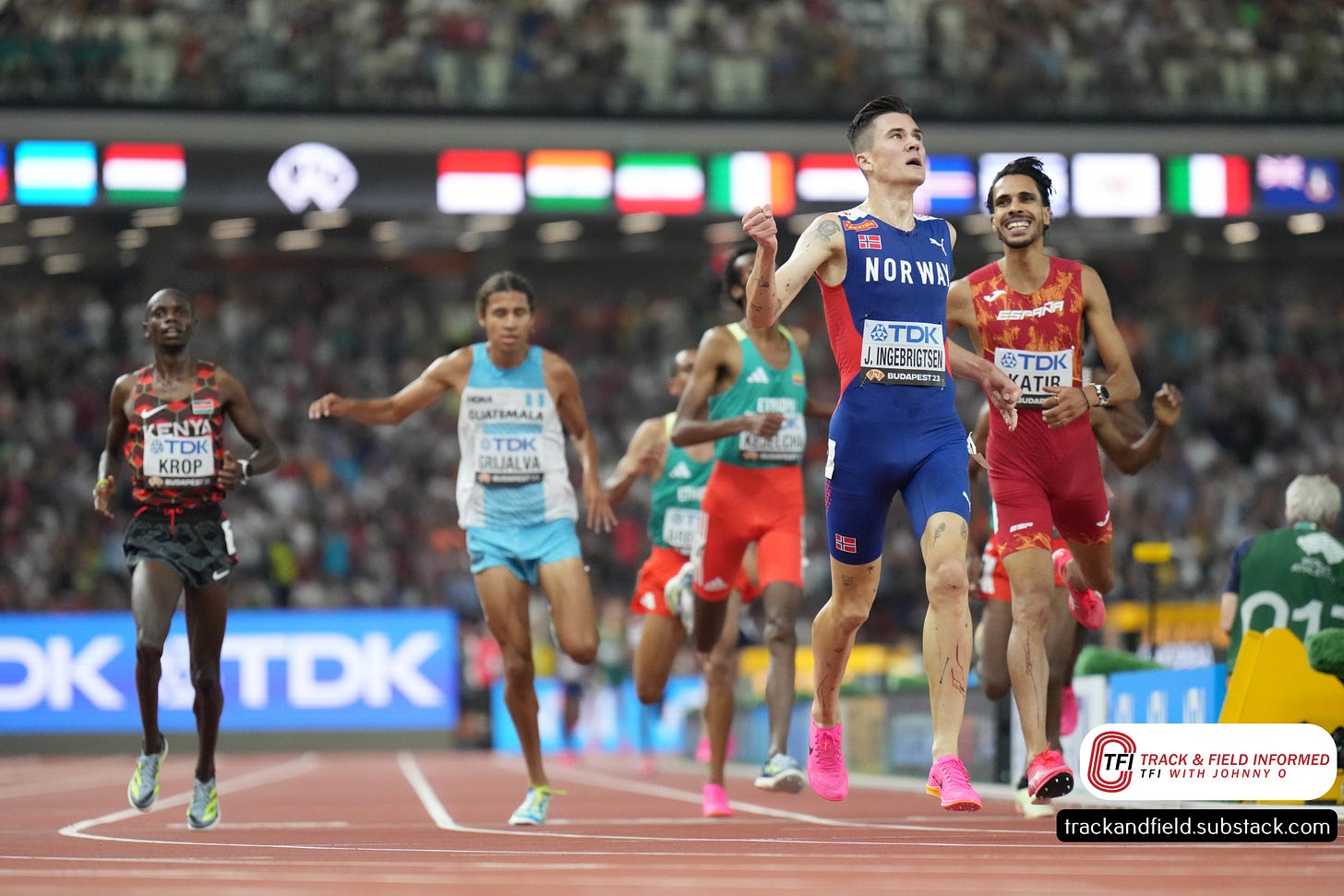
Moraa was one of six athletes who won individual gold medals on the final day of the nine-day meet.
The others were Jakob Ingebrigtsen of Norway in the men’s 5,000 meters, Winfred Mutile Yavi of Bahrain in the women’s 3,000-meter steeplechase, Neeraj Chopra of India in the men’s javelin, Yaroslava Mahuchikh of Ukraine in the women’s high jump, and Victor Kiplangat of Uganda in the men’s marathon.
In the final two events of the championships, the U.S. had a comfortable margin of victory in the men’s 1,600-meter relay and the Netherlands nipped Jamaica in the final five meters of the women’s event, thanks to a terrific anchor leg by Femke Bol.
In one way, Ingebrigtsen’s victory in the 5,000 meters was similar to his win in last year’s meet in that it followed an upset loss to a British runner in the 1,500 earlier in the week.
In another, it was quite different. For while he entered last year’s race feeling very confident about his chances, he told NBC Sports’ Lewis Johnson afterwards that he did not know what to expect this year because he was battling a “virus” that had affected his performance in the 1,500 on Wednesday when Josh Kerr of Great Britain outkicked him in the home straightaway.
Luckily for Ingebrigtsen, and not surprising for anyone who has watched global title races in the men’s 5,000 in recent years, the early pace was very pedestrian as Ishmael Rokitto Kipkurui of Kenya led the field through 2,000 meters in 5:29.34.
Hagos Gebrhiwet of Ethiopia was in the lead at three kilometers in 8:13.11 and countryman Berihu Aregawi — who had run a yearly world-leading time of 12:40.45 in Lausanne — led at 4,000 meters in 10:49.71 after the pace had picked up some.
Things started to get serious in the next lap as Ethiopian Gebrhiwet came through 4,400 meters in 11:50.53 after a 60.82 11th lap.
When the bell for the last lap clanged 200 meters later, Ingebrigtsen was in fourth place behind Gebrhiwet, Aregawi, and Mohamed Katir of Spain, who like Ingebrigtsen also excels in the 1,500.
Katir and Ingebrigtsen moved into first and second place by the end of the backstretch and Katir launched a long drive for home as he raced around the curve.
After taking a quick glance over his shoulder coming off the turn, Ingebrigtsen set his sights on Katir. At first, he did not make up much ground on the Spainard. But he gradually began to reel him in with 30 meters left in the race and moved past him in the final 10 meters to cross the finish line in 13:11.30 to Katir’s 13:11.44.
Jacob Krop of Kenya, the silver medalist last year, finished third in 13:12.28. He was followed by Luis Grijalva of Guatemala (13:12.50) and Ethiopians Yomif Kejelcha (13:21.51) and Gebrhiwet (13:12.65). Aregawi finished eighth in 13:12.99.
Feeling well or not, Ingebrigtsen ran his final 200 meters in 26.20, his last 300 in 39.09, and his final 400 in a scintillating 52.45. His last 800 took a scant 1:50.65.
“I had a big feeling of relief when I got to the finish line,” Ingebrigtsen told Johnson. “I knew that I needed to do an absolutely perfect race to be able to win. So I really, really had to be patient and do my final sprint almost on the finish line. So it worked out but of course it’s a little bittersweet. A great victory again, a great achievement, but I’m not happy to be in this situation. I hope to never experienced this in the future.”
Yavi had finished fourth in the women’s steeplechase in the previous two World Championships. But she was a little under the radar entering this year’s meet as her most recent performance had come on July 6 when she ran 9:04.58 to win the Arab Games in Algiers, Algeria.
Beatrice Chepkoech of Kenya, who set the world record of 8:44.32 in 2018 and won the 2019 World title, pushed the pace for most of the race on Sunday. She came through the first kilometer in 2:58.90 and the second in 5:57:75.
The 23-year-old Yavi was in second place behind Chepkoech with a lap to go. But she moved into the lead about 30 meters later and was never seriously challenged after that. She had a five-meter lead over the Kenyan heading down the backstretch, but she blew the race open after hurdling the water jump — she does not step on the barrier when she goes over it — for the final time and picking up the pace in the home straightaway.
Her time of 8:54.29 cut a little more than two seconds off her previous best from last year, was the fifth fastest ever run, and moved her to fourth on the all-time world performer list.
Chepkoech finished second in 8:58.98, followed by countrywomen Faith Cherotich in a personal best of 9:00.69, a time that moved her to 12th on the all-time performer list.
Zerfe Wondemagegn of Ethiopia placed fourth in 9:05.61, followed by Alice Finot of France in 9:06.15 and Marusa Mismas Zrimsek of Slovenia in 9:06.37. The times by Finot and Mismas Zrimsek were national records and moved them to 19th and 20th on the all-time performer list.
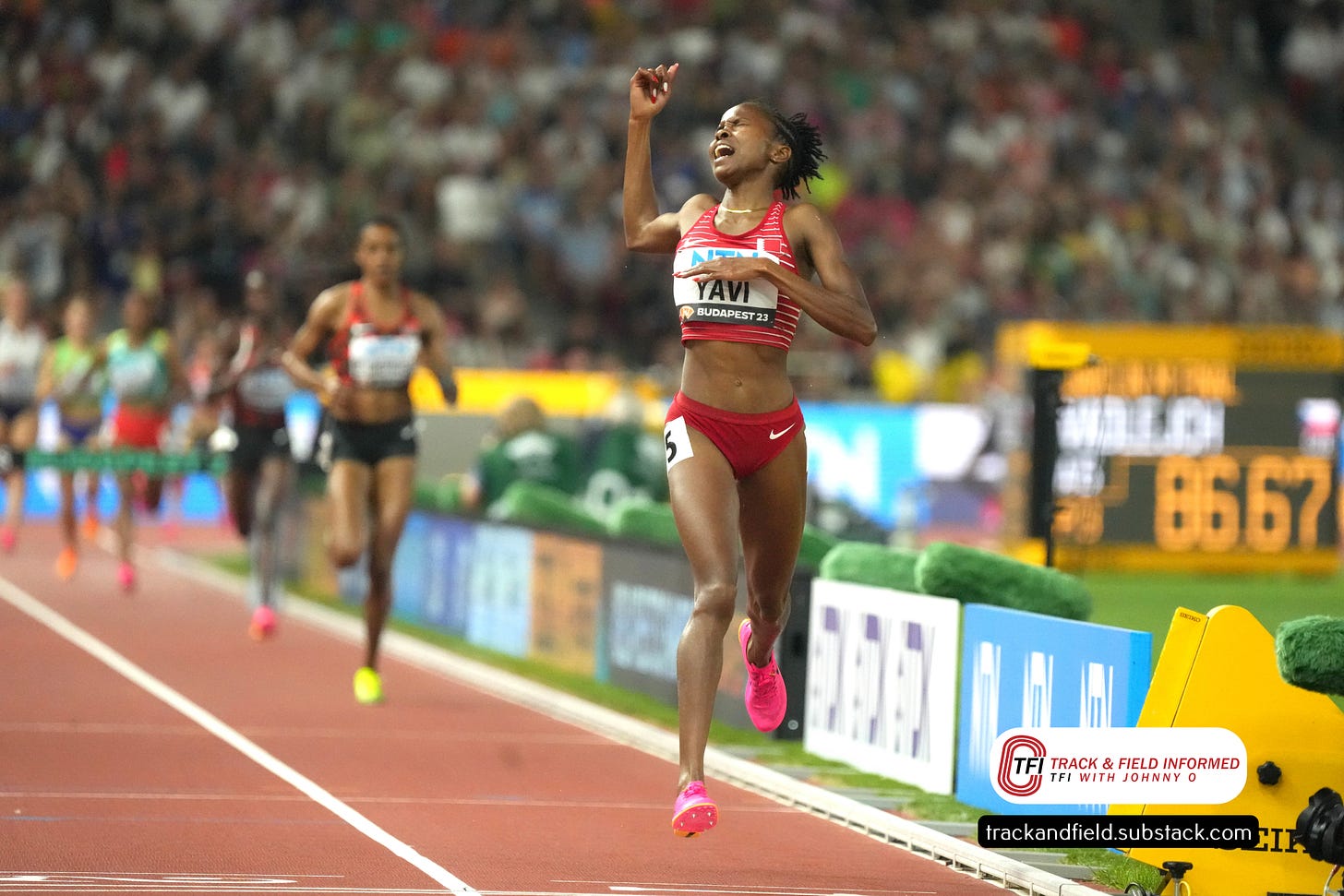
Yavi said in a Reuters post that she did not know where her time ranked on the all-time list until someone told her.
“I am really excited about that,” she said. “It was a fast race but I did not realize it was that fast. I knew I would have the power on the last lap. It was perfect. I have never felt like this before. After finishing fourth at the past two world championships, the gold medal gives me additional motivation to train hard.”
Olympic champion Chopra won his first World title in the men’s javelin after finishing second last year.
The 25-year-old, who had only competed in two meets — both victories — this season before the World Championships, fouled on his first attempt. But his second effort turned out to be the winning throw as it measured 88.17 meters (289 feet 3 inches). He also had throws of 87.73 (287-10) in the fifth round and 86.32 (283-2) in the third.
Arshad Nadeem of Pakistan, fifth last year, placed second at 87.82 (288-1). Jakub Vadlejch of the Czech Republic had a best of 86.87 (284-4) to match his third-place finish from a year ago,
Julian Weber of Germany placed fourth at 85.79 (281-5), followed by Indians Kishore Jena at 84.77 (278-1) and D.P Manu at 84.14 (276-0).
“It was my dream to win gold at the world championships,” Chopra said in a sports.yahoo.com post. “This has been a great championships for India and I am proud to bring another title to my country."
Chopra had thrown a season best of 88.77 (291-3) in the qualifying round on Friday and hoped to top that mark in the final.
“I wanted to throw more than 90 [meters] but it needs all parts of the puzzle to be there. I couldn't put it all together this evening. Maybe next time."
With her victory in the women’s high jump, Mahuchikh added to her impressive list of medal-winning performances in global title meets.
The 21-year-old Ukrainian had previously placed second in the 2019 World Championships in Doha, Qatar, third in the Olympics, and first in the 2022 World Athletics Indoor Championships in Belgrade, Serbia in March of last year before finishing second in the outdoor meet in July.
After passing the opening height of 1.85 (6-0¾) on Sunday, she cleared 1.90 (6-2¾) on her first attempt before needing two tries to get over 1.94 (6-4¼). She then cleared 1.97 (6-4½) and 1.99 (6-6¼) on her first attempts before clearing what turned out to be the winning height of 2.01 (6-7) on her second try.
With the victory in hand, she then missed three attempts at 2.07 (6-9½), which would have been a national record. It also would have moved her into a three-way tie for third on the all-time performer list had she cleared it.
Defending champion Eleanor Patterson of Australia finished second at 1.99, with countrywoman Nicola Olyslagers placing third at the same height.
Patterson finished ahead of Olyslagers because she cleared 1.99 on her first attempt and Olyslagers made the height on her second try.
Morgan Lake of Great Britain finished fourth at 1.97, and Lamara Distin of Jamaica and Iryna Gerashchenko of Ukraine tied for fifth at 1.94.
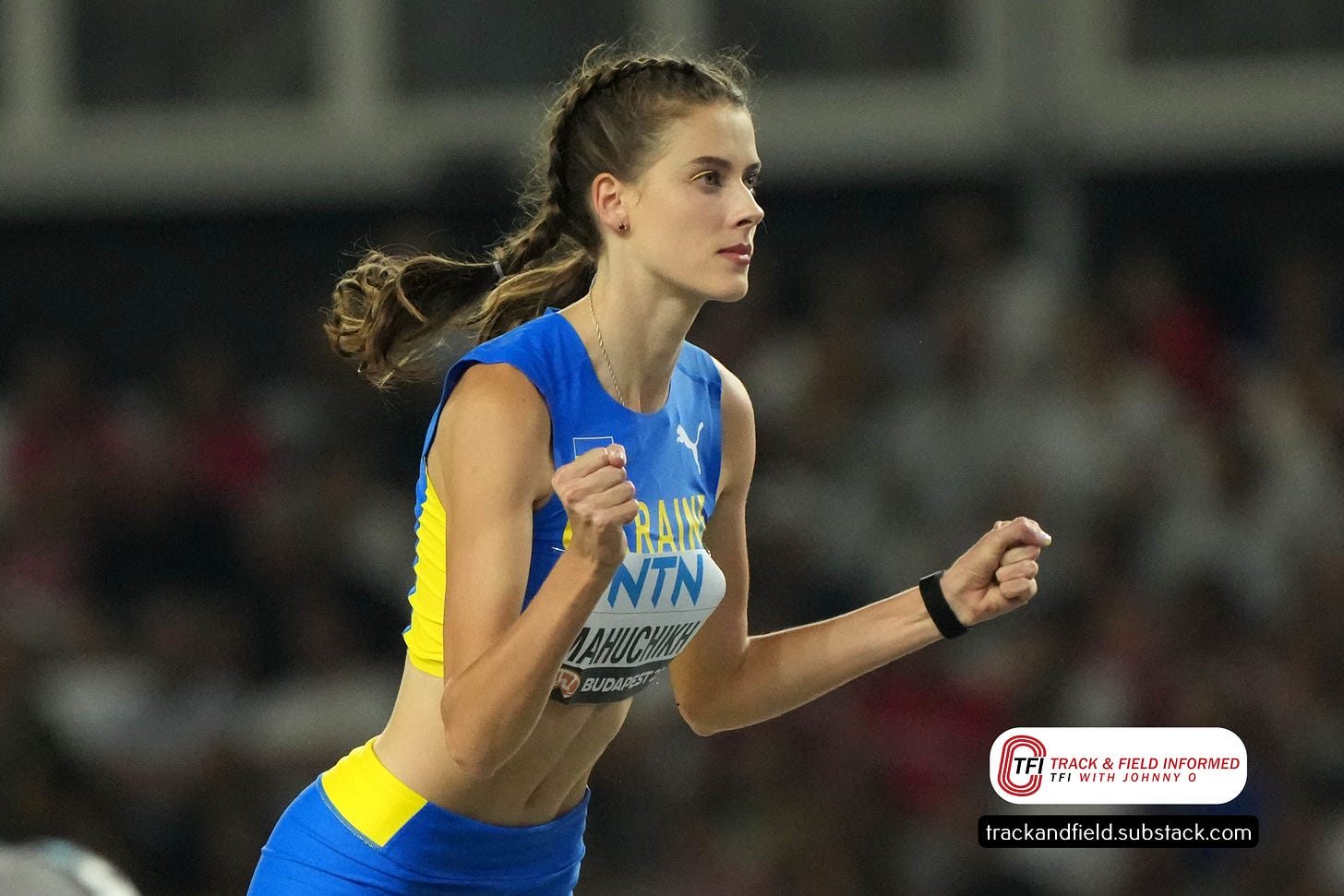
“I am so proud to win this gold for my country,” Mahuchikh said in a World Athletics post. “Silvers from Doha and Eugene definitely were not enough for me. I have been one of the best woman high jumpers over the last few years and I badly wanted to become the best in the world officially.
She than added that before “every single one of my jumps tonight I said to myself that I had to win gold. Only gold. For all my team that believes in me. For my family, for my father who could not come here to support me, but I felt his energy despite hundreds of kilometers between us.
“I had to win this gold for my country and all Ukrainian people who are still fighting for peace in Ukraine and for our independence. Thanks to them we have this unique possibility to compete at the international arena and to raise our flag.”
Like the women’s marathon on Saturday, the men’s marathon on Sunday morning was very much affected by the warm and muggy conditions.
The lead pack went through the halfway mark in one hour five minutes 2 seconds and reached the 25-kilometer mark in 1:17:05, which projected to a final time of 2:10:06.
The leaders ran the next five kilometers in 15:09, the second-fastest fastest split of the race, to come through 30 kilometers in 1:32:14.
The lead pack was down to six runners at that point, comprised of defending champion Tamirat Tola and fellow Ethiopians Leul Gebresilase and Milkesa Mengesha, Ugandans Kiplangat and Stephen Kissa, and Kenyan Timothy Kiplangat, who is unrelated to Victor Kiplangat.
An unfortunate incident occurred about five minutes later when Kissa tripped and fell after running very close to Timothy Kiplangat as they went past an aid station.
Kissa lay on the ground for 10 or 15 seconds before getting to his feet, but he was never able to re-connect with the lead pack.
The lead group was reduced to Victor Kiplangat, Gebresilase, and Tola shortly after that and Kiplangat and Gebresilase had a 10-second lead over Tola five minutes later.
Gebresilase ran just behind Kiplangat for the next dozen minutes before Kiplangat broke away from the Ethiopian around the 38-kilometer mark.
Gebresilase and Tola appeared to be headed to second- and third-place finishers at that point, but they both began to slow as the race wore on.
Maru Teferi of Israel, who had fallen near an aid station shortly after Kissa went down, passed Tola shortly after the 40-kilometer mark and he ended motoring past a worn out Gebresilase in the final 150 meters of the race to finish second.
Kiplangat had a large enough lead that he was able to run the last few hundred meters carrying a Ugandan flag that had been given to him as the course finished in an area known as Heroes’ Square.
He crossed the line in 2:08:53, followed by Teferi in 2:09:12 and Gebresilase in 2:09:19.
Tebello Ramakongoana of Lesotho finished fourth in 2:09:57, followed by Kissa at 2:10:22 and Mengesha at 2:10:43. Tola did not finish.
“This has been my dream and it has come true at last,” Kiplangat said in a World Athletics post. “Last year I was Commonwealth Games champion and that made me think this year I must become world champion. Now my prayers have been answered and hopefully next year in Paris I will become Olympic champion too.”
He added that “It was hard today because it was so hot but I felt comfortable because I prepared well for this weather. I knew it was possible because I had trained well. It was a dream and a mission and I did it today.
“When I reached 30 kilometers, I knew I felt strong and I decided to push. I had great energy and that allowed me to go. Then at 35 kilometers I could surge again. That was always my plan and I managed to do it.”
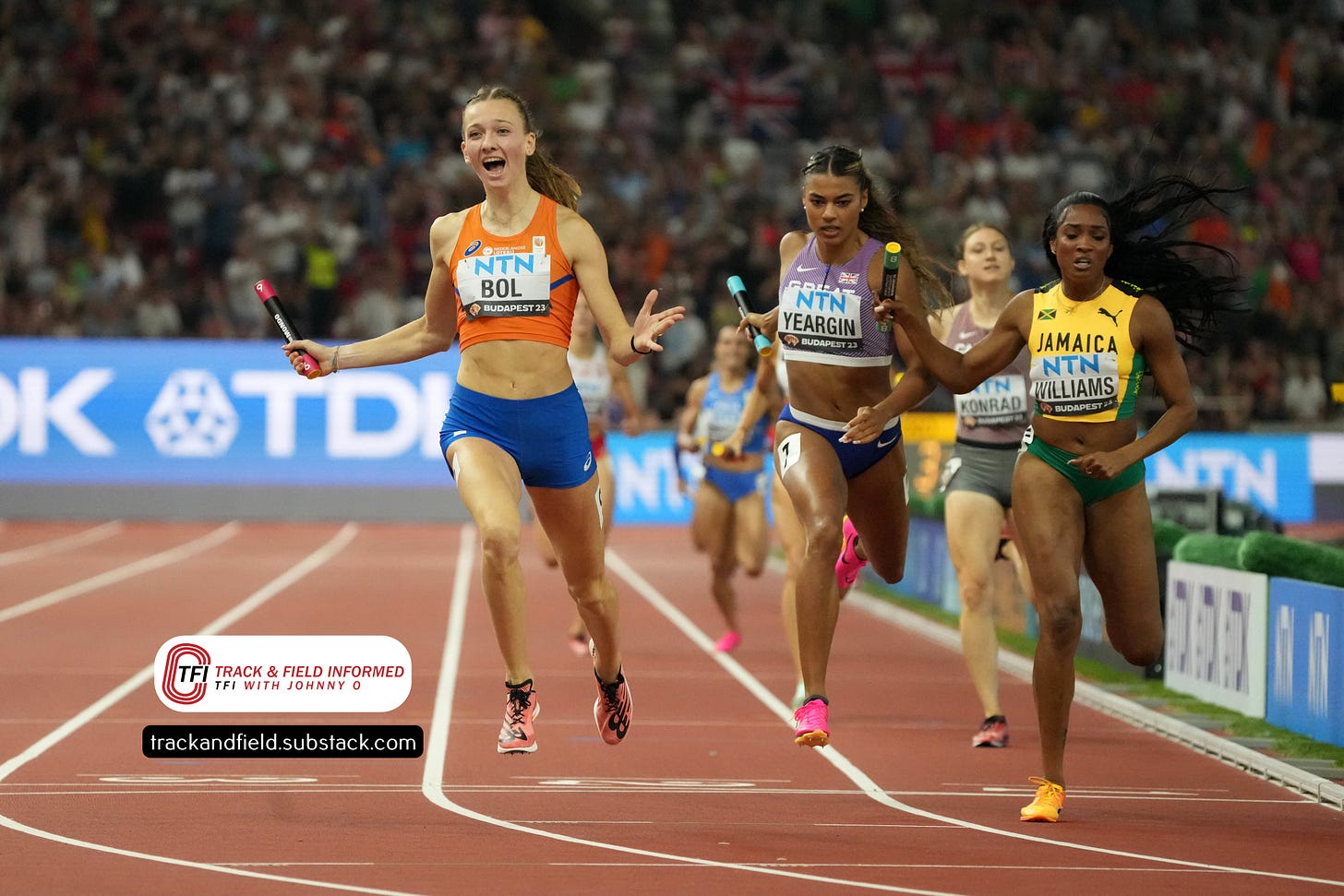
The U.S. appeared to have the best team on paper in the men’s 1,600-meter relay and it played out that way in the race.
Quincy Hall and Vernon Norwood, who placed third and fourth in the 400 on Thursday, gave the Americans a comfortable lead at the halfway point after running legs of 44.54 and 44.01 seconds, respectively.
Justin Robinson followed with 44.74 carry and Rai Benjamin closed it out with a 44.02 anchor leg for a final time of 2:57.31.
France finished second with a national record of 2:58.45, followed by Great Britain in 2:58.71, Jamaica in 2:59.34, India in 2:59.92, and the Netherlands in 3:00.40.
It was the ninth victory in the last 10 World Championships for the U.S. and it was the second time in the last three wins that intermediate hurdler Benjamin had run the anchor leg. Benjamin also ran the anchor leg on the victorious 1,600 relay team in the Olympics.
“I felt like I wasn’t moving that fast,” Benjamin said when Johnson informed him of his split while he was interviewing all four team members. “But I was just happy that these guys opened up the lead for me. That’s what we talked about… It means a lot to me that these guys have faith in me and trusted me to bring home the gold.”
The U.S. was heavily favored to win the women’s 1,600 relay at the start of World Championships, but when the American team was disqualified for a passing zone violation in a qualifying heat on Saturday, it appeared to turn the final into a more competitive affair.
It turned out to be a thrilling final event of the meet as Femke Bol anchored the Netherlands to a come-from-behind victory in which she passed Great Britain anchor runner Nicole Yeargin with about 10 meters left in the race before speeding past Jamaica’s Stacey Ann Williams with about three meters remaining.
Bol had a disappointing start to the meet on August 19 when she tied up toward the end of her anchor leg in the mixed-sex 1,600 relay and then fell to the track with five meters left in the race as she tried to beat Alexis Holmes of the U.S. to the finish line. But she bounced back to post a runaway victory in the 400-meter hurdles with a 51.70 clocking on Friday.
She was in third place behind Jamaica and Great Britain when she received the baton for her anchor leg on Sunday. And she was far enough behind Williams that Ato Boldon of NBC Sports said that he thought she had too much ground to make for a Dutch victory.
Bol lost ground to Williams and Yeargin during the first 270 meters of the race, but she began to close in on them as they neared the end of the second turn and entered the home straightaway.
She did not make up a lot of ground at first, but it became noticeable with 40 meters to go.
Bol, seeing what was happening in front of her, never lost her form and managed to stay relaxed as she reeled in the two women in front of her.
The Dutch team clocked a national record of 3:20.72 as Eveline Saalberg ran 51.85 seconds on her first leg, followed by Lieke Klaver at 48.71, Cathelijn Peeters at 51.37, and Bol at 48.79. Jamaica timed 3:20.88 and Great Britain clocked 3:21.04.
Canada placed fourth in 3:22.42, followed by Belgium in 3:22.84 and Poland in 3:24.93.
“The first three legs went so well, I felt like I had to finish as strongly as I could,” Bol said in a World Athletics post. “I wanted to stay patient, but in the last meters, I said 'No, we have to take it'.
“It was one of my most important runs ever, but it is the first time we became world champions so it applies for all of us. Every tenth and hundredth of a second was needed. We had good exchanges and still barely won it.”



